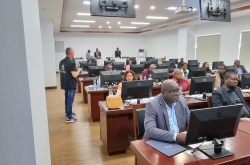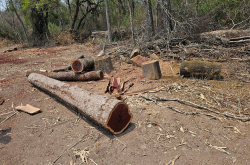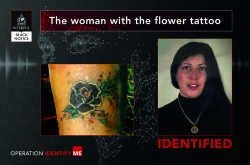KATHMANDU, Nepal – The ability of terrorist groups and suicide bombers to launch coordinated mass attacks continues to threaten South and Southeast Asia.
The process of identifying victims of these attacks can be difficult as it often requires the comparison of fingerprints, DNA profiles or dental records. A country may also not have sufficient resources to handle mass casualties, especially if the victims include nationals from many different countries.
For this reason, INTERPOL held a Post-Blast Investigation Training Course from 29 October to 2 November 2018 in Kathmandu, Nepal, for 32 officers from nine countries in South and Southeast Asia. Organized in the framework of INTERPOL’s Project Scorpius, a two-year capacity building project funded by the Government of Canada to combat terrorism and related transnational crimes, the course was designed to enhance the capacity of the region to conduct bomb scene and DVI investigations.
The training developed the skills, knowledge and mind-set required to effectively respond to such events and conduct examinations, and to assist investigators in securing vital evidence to prosecute the perpetrators of terrorist acts.
As part of the training, officers from the Nepalese Police, together with an Australian bomb forensic expert, built and detonated six explosive devices as part of a practical exercise on improvised explosive device (IED) construction and fragment identification.
Forensic pathologists from Australia also delivered an explosive and injuries workshop with a particular focus on suicide bombers.
“The training knowledge and materials provided by INTERPOL will allow us to increase our capacity to respond to terrorism attacks and our institutional memory, and we therefore welcome the opportunity to have hosted this training,” said Dhiru Basnyat, Additional Inspector General of Police, Executive Director of the National Police Academy of Nepal.
Participants also took part in a two-day field exercise, which included training on crime scene investigation, victim recovery and post-mortem identification techniques.
“A strong component of the session was designed to recognize how respect for bomb victims, their families and their rights, both immediately after a terrorist incident and in the long term, has a positive impact in the criminal justice process, and in countering violent extremism,” said Jorge Fainstein Day Gastrell, Assistant Director of INTERPOL’s Capacity Building and Training Directorate.
The training was carried out with the support of instructors from Alliance for a Peaceful Indonesia, Canterbury Christ Church University, the Indonesian National Police, the Forensic Pathology Institute of Nepal, the Nepal Police, the Royal Canadian Mounted Police and the Western Australia Police.
Countries participating in the meeting were Bangladesh, Indonesia, Malaysia, Maldives, Nepal, Pakistan, Philippines, Sri Lanka and Timor Leste.
Pays concernés
Actualités associées

INTERPOL welcomes new DNA legislation in Belgium
11 avril 2024












